人教八年级现在完成时have been in, have been to 与have gone to精讲
中考英语考点精讲十五-八年级(下)Units-9-10
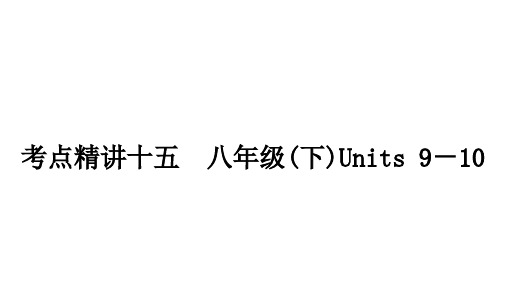
20.(2020·常州改编)Many parents are considering cchhoooosinsigng(choose) a good school for their children. 21.Yuan Longping, the father of hybrid rice, is generally
座城市待了 20 天了。
【注意】若以上三个词组后接 here,there 或 home 等地点副词时,介词 to 或 in 要省略。
1.—(2021·泸州)Where is Lucy? I haven't seen her for days. —She __A__ Chengdu.She'll be back next week. A.has gone to B.has been to C.have gone to D.have been to
5.—I can't find John in the classroom. —Oh.He has ggoonne e(go) to the library.
【教材原句】It also encourages governments and social groups to think about ways to improve toilets in the future.这也会鼓励政府和社会团体去 考虑一下未来改进厕所的办法。(Unit 9 P67)
人已不在现场,可能在去的途中, gone to Changsha.李先生
也可能已经到达目的地
不在这里,他去长沙了。
His grandparents have
have 意为“待在某地”,表示状态,后面 been in the city for twenty
Have been to, have gone to与have been in的用法区别

Have been to, have gone to与have been in的用法区别Where’s your freind?She to London.A.wentB.Has goneC.Has been(朋友去了伦敦,你是用现在完成时态还是用一般过去时态?)1、have gone to意为“已经去了某地”,说话时该人还没回来。
因此,一般不会用第一人称和第二人称的代词作句子的主语。
如:Mr. Wang isn't here.He has gone to Qingdao.王先生不在这里。
他去青岛了。
2、have been to意为“曾经去过某地”,表示现在已不在那里了,后面可以接次数,如once,twice,three times等,表示“去过某地几次”,也可和just,never,ever,before等连用。
如:(1)My father has been to Beijing twice.我父亲去过北京两次。
(2)I have never been to the Great Wall before. 我以前从未去过长城。
上面的第(2)句特别要注意,很多同学一看到before这个单词,想到它的意思是“以前”,所以就条件反射地认为这句话应该用一般过去时态,实际上就错了。
Before作副词时,它也是现在完成时态的标志词之一。
3、have been in表示“一直在某地”,常与时间段状语连用,这种状语包括四种情况:(1)for+时间段。
如:I have been in Shanghai for three years. 我到上海已有三年了。
(“三年”属于时间段)(2)since+时间点。
如:He has been in London since last year. 他自从去年就在伦敦了。
(“去年”是时间点)(3)since+时间段+ago。
如:He has been in London since five years ago. 他自从五年前就在伦敦了。
现在完成时导学案--人教版八年级下册

现在完成时导学案班级:__________ 姓名:______________【内容目标】1.现在完成时的用法(现在完成时的定义)。
2.现在完成时的基本结构。
3.现在完成的时间状语(即关键词/标志词)。
4.have/has been to 、have/has gone to、have/has been in 的用法区别。
5.与一般过去时的用法区分。
6.瞬间动词(即短暂性动词)转换成延续性动词后与时间段的关系特殊情况:和运用。
(for与since的用法区别;how long)。
【学习重点】正确理解现在完成时的定义和基本结构,易混短语的用法辨析等,能够综合运用,巩固提高。
【学习难点】能准确运用短暂性动词和延续性动词。
【学习方法】发挥主观能动性,充分利用对比分析法、归纳总结法、合作探究法、互助学习法和练习法进行复习。
一、【课前延伸】写出下列动词的过去式和过去分词1.want ________2.visit__________3.love__________4. play_______5.study___________6.stop__________7.speak_______8.write______小结:动词规则的过去式和过去分词变化规则一样:一般动词词尾直接加-ed;以e结尾动词只加-d;以辅音字母加y结尾的动词,把y变为i再加-ed;以重读闭音节结尾且末尾只有一个辅音字母的动词,双写辅音字母,再加-ed。
动词不规则的过去式和过去分词只能特别记!二、【课前热身】翻译句子:1.我已经刷牙了。
_____________________________( 现在的结果:牙齿干净了。
)2.她已经洗脸了。
_______________________________( 现在的结果:脸干净了。
)3.我们已经吃早餐了。
__________________________( 现在的结果:饱了。
)4.我已经在这里住了十年了。
人教版八年级英语下册现在完成时讲解及练习
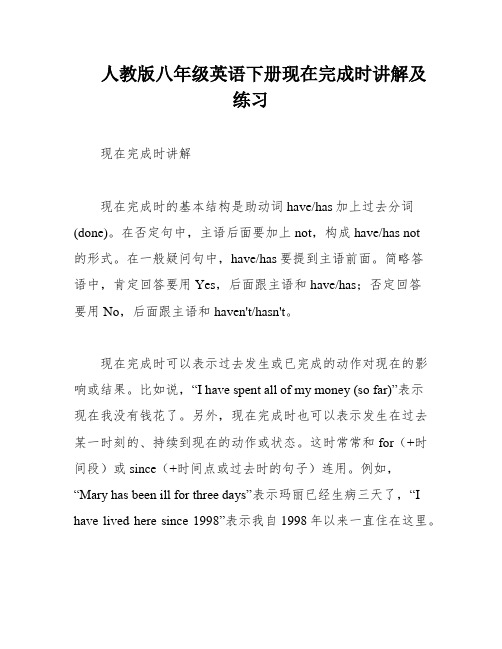
人教版八年级英语下册现在完成时讲解及练习现在完成时讲解现在完成时的基本结构是助动词have/has加上过去分词(done)。
在否定句中,主语后面要加上not,构成have/has not的形式。
在一般疑问句中,have/has要提到主语前面。
简略答语中,肯定回答要用Yes,后面跟主语和have/has;否定回答要用No,后面跟主语和haven't/hasn't。
现在完成时可以表示过去发生或已完成的动作对现在的影响或结果。
比如说,“I have spent all of my money (so far)”表示现在我没有钱花了。
另外,现在完成时也可以表示发生在过去某一时刻的、持续到现在的动作或状态。
这时常常和for(+时间段)或since(+时间点或过去时的句子)连用。
例如,“Mary has been ill for three days”表示玛丽已经生病三天了,“I have lived here since 1998”表示我自1998年以来一直住在这里。
现在完成时还有一些标志词,可以表达过去完成的动作对现在的影响。
这些标志词包括already、just和yet。
例如,“He has al ready got her help”表示他已经得到她的帮助,“He hasn't come back yet”表示他还没有回来。
This is the best film I have ever seen。
I have never seen a better movie before.He has never been to Beijing before。
He has never had the chance to visit Beijing.He says he has been to the USA three times already。
He has had the opportunity to visit the USA on three separate ns.So far。
Have been (to)和have gone(to)的区别

Have been (to)和have gone(to)的区别:“have been (to)”指“曾经到过某地”,说话时此人已经不在那里,已经回来、侧重指经历。
I have been to America. 我去过美国。
“have gone (to)”指“已经去某地了、到某地去了”,说话时此人在那里,或可能在路上,反正不在这里。
He has gone to America. 他已经去了美国。
Where is Zhang Yang ? He _____ _____ _____Yongxin.张扬在哪儿?他去永新了:I ____ ____ _____ Guosheng eight times 我去过国胜八次。
have /has been to意思是___________/have /has gone to意思是___________(其中have/ has 是______/)练习:1.I have been to an amusement park.(一般疑问句)______ you _______ to an amusement park? Yes , I _________.\No, I ___________.I _________ __________ to an amusement park.( 否定句)2. I have been to the zoo a lot of times. 答语______________. ( 我也是)I’ve never been to a water park. 答语____________\ I haven’t _____.( 我也没去过)B、观察分析1 I have been to an amusement park2 He has lived here since 1992.结论:现在完成时基本结构:________ + _________其中have/has定义(一):现在完成时表示过去或已完成的对现在造成的,常与already, yet, just,before, ever, never, once, twice, many times,so far等时间状语连用:Eg:_____ you _____ (have)your lunch yet?Yes,I have.I _____ already ______(read)this book.现在完成时用法(二):现在完成时也表示从过去某一时间开始一直持续到现在的动作或状态。
人教版英语八年级下册现在完成时(易懂版本)
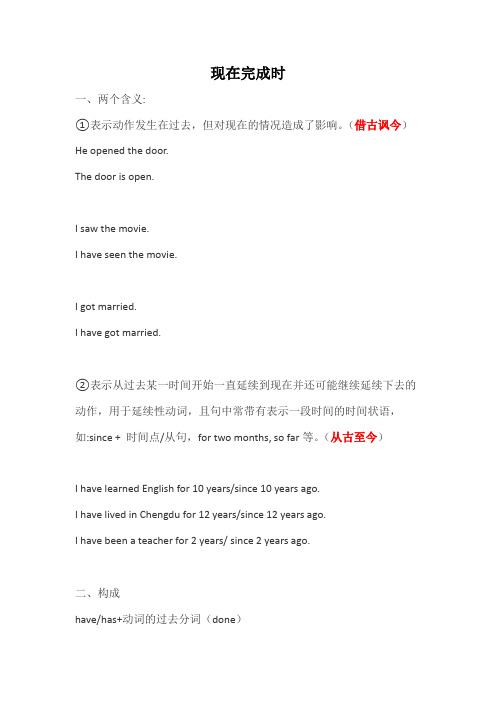
现在完成时一、两个含义:①表示动作发生在过去,但对现在的情况造成了影响。
(借古讽今)He opened the door.The door is open.I saw the movie.I have seen the movie.I got married.I have got married.②表示从过去某一时间开始一直延续到现在并还可能继续延续下去的动作,用于延续性动词,且句中常带有表示一段时间的时间状语,如:since + 时间点/从句,for two months, so far等。
(从古至今)I have learned English for 10 years/since 10 years ago.I have lived in Chengdu for 12 years/since 12 years ago.I have been a teacher for 2 years/ since 2 years ago.二、构成have/has+动词的过去分词(done)三、标志词for, since, already, yet, before, recently, over the …., in the past few…..四、already与yet的区别already用于肯定句(已经)yet用于否定句(还)和疑问句(已经)ever & neverever作副词,意为“曾经”,常用于现在完成时的一般疑问句和肯定句中,置于主语之后,过去分词之前。
never作副词,意为“从不;从未”,用于现在完成时中,表示否定,位于助动词have/has之后,过去分词之前。
五.have been to & have gone to & have been inhave been to 去了某地,已回have gone to 去了某地,未回have been in 在哪里待了多久后面是地点副词there、here、home 时,省略to六、延续性和非延续性1. 含义:延续性动词表示能够延续的动作,这种动作可以延续下去或产生持久影响。
英语八年级下册Unit9havehasbeento与have
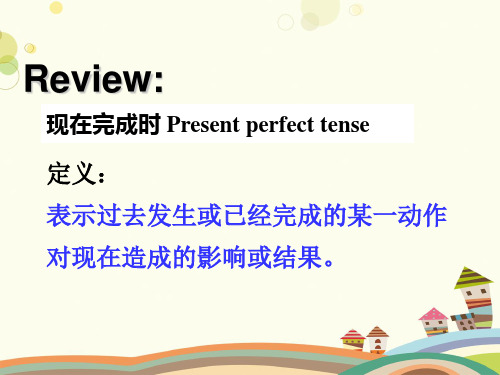
2. have (has) gone to 意为“到某地去了”,表示到了某地或正在去某地句子中。
A: Where is Tom? 汤姆在哪里?
B: He has gone to the bookshop. 他到书店去了。
A SHORT VEDIO
学以致用
• 用 have been to/have gone to填空 • 1) ---Where's Jim?---- He has __g_o_n_eto Guiling. • 2) She has___g_o_neto the park, and she will be back in two hours. • 3) I have __b_e_e_nto the West Lake.Look!I have taken many
ave/has been to与have/has gone to 的区别
1. have (has) been to意为“曾经去过某地”,表示现在已经 不在那里了。可与just, ever, never等连用。
Mary has never been to the Great Wall. 玛丽从未去过长城。
photos on it . gone
• 4) Tom has_____ to Jim's home,but he hasn't come back. been
• 5) They have_____ to the forest alone and returned safely.
Thanks for your time!
I’ve just been to the post office. 我刚才去邮局了。 Have you ever been to Hangzhou? 你曾经去过杭州吗?
现在完成时(unit8--unit10知识点总结)人教版英语八年级下册

现在完成时一.定义三要素与构成〔has/have done〕1.表示到现在为止已经完成或刚刚完成的动作。
By now, I have remembered 1000 English words.2.一件发生在过去的事情对现在产生影响。
常见时间状语:常和already〔已经〕,yet〔已经〕,just〔刚刚〕,still〔仍旧〕,so far〔到目前为止〕,till now,(直到现在),before〔以前〕,ever〔曾经〕,3 times(三次),in the past/last..years(在过去几年)I have spent all of my money so far.(1)already:〔已经〕用于确定句位置:放于助动词与done 之间或者放在句末(2)yet:疑问句〔已经〕否认句〔还〕位置:常放句尾(3)ever(曾经):疑问/确定位置:助动词与done之间(4)never〔从不〕位置:助动词与done之间【练习】〔1〕——你吃过早餐了吗?—Have you had breakfast ____?——是的,我已经吃过了。
/不,我还没吃。
—Yes,I have ________ had it./No,I haven’t had it ____.〔2〕I have ______ read this book,so I don’t know what it is about.〔3〕—Have you _____ been to the Great Wall? It’s so wonderful and great.—No,I have ______ been there.3.一个动作开头于过去,并持续到现在〔或许还将持续下去〕。
常见时间状语:①for+一段时间“长达/持续了……②since+过去一个时间点,表示“自从……以来〞时间段+ago,表示“从……以前〞+for+时间段从句〔一般过去时〕eg:Mary has been ill for three days.We have been classmates since 2 years ago.【练习】〔1〕我已经住在这里十年了。
初中英语人教版八年级下册have been to 和have gone to区别

现在完成时(微课)教学设计
双鸭山市第三十二中
路平
初三时态复习之现在完成时(微课)教学设计
授课内容
时态复习之现在完成时
科目
英语
教学对象
九年级学生
课时
1课时
提供者
路平
一、教材内容分析
本节课内容属中学阶段英语学科,现在完成时在人教版八年级教材中运用三个单元再对这个知识点进行讲解和训练,是初中学生学习的重点,也是学生学习的难点。
二、教学目标(知识与技能、过程与方法、情感态度与价值观)
根据新课程标准的要求,结合教材的具体内容,我确立教学目标为:
知识目标:是学生认识和掌握现在完成时态
能力目标:使学生能熟练掌握现在完成时并在实际生活中加以运用
情感目标:在老师讲解、学生在学习的过程中,创建更好的学习氛围
三、教学策略选择与设计
本着课堂上以教师为主导、学生为主体的教学原则,这节课的教学主要采用教师展示课件,学生网络查找,教师指导点拨,学生合作探究,师生共同学习等策略,为了达到课堂的最佳效果,在策略实施过程中关键是营造诗意氛围,激活学生思维。
五、教学环境及资源准备
在教学过程中,为支持教师的教,我将Flash动画与PowerPoint相结合,增强直观性,趣味性;为支持学生的学,则选择了微机室的学习环境,并利用网络信息资源,增强自主性、实效性。
六、教学过程
教学流程图
1.复习并巩固现在完成时的定义和结构
2.复习并巩固现在完成时态的用法并加以运用
3.区分“have/has been to”“have/has gone to”和“have/has been in”
4.区分一般过去时与现在完成因是因为这个知识点在人教版八年级教材中运用三个单元在对这个知识点进行讲解和训练,是初中学生学习的重点,也是学生学习的难点。这节微课,从现在完成时的定义到结构,从用法到实际训练,从区分短语到区分时态,由简到难,将知识点逐步深入,以便学生更好地理解和学习。
最新人教版八年级英语下册第八单元现在完成时讲解及练习
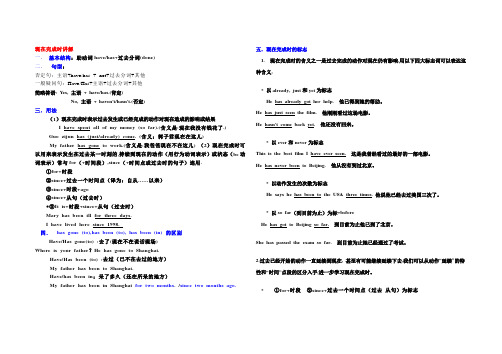
现在完成时讲解一.基本结构:助动词have/has+过去分词(done)二.句型:否定句:主语+have/has + not+过去分词+其他.一般疑问句:Have/Has+主语+过去分词+其他.简略答语: Yes, 主语+ have/has.(肯定)No, 主语+ haven't/hasn't.(否定)三.用法(1)现在完成时表示过去发生或已经完成的动作对现在造成的影响或结果I have spent all of my money (so far).(含义是:现在我没有钱花了.)Guo zijun has (just/already) come. (含义:郭子君现在在这儿)My father has gone to work.(含义是:我爸爸现在不在这儿) (2)现在完成时可以用来表示发生在过去某一时刻的,持续到现在的动作(用行为动词表示)或状态(be动词表示)常与for(+时间段),since(+时间点或过去时的句子)连用.①for+时段②since+过去一个时间点(译为:自从……以来)③since+时段+ago④since+从句(过去时)●⑤It is+时段+since+从句(过去时)Mary has been ill for three days.I have lived here since 1998.四.has gone (to),has been (to), has been (in) 的区别Have/Has gone(to) :去了(现在不在说话现场)Where is your father?He has gone to Shanghai.Have/Has been (to) :去过(已不在去过的地方)My father has been to Shanghai.Have/has been in:呆了多久(还在所呆的地方)My father has been in Shanghai for two months. /since two months ago. 五.现在完成时的标志1.现在完成时的含义之一是过去完成的动作对现在仍有影响,用以下四大标志词可以表达这种含义:* 以already, just和yet为标志He has already got her help.他已得到她的帮助。
八年级英语下册 Unit 9 Have you ever been to a museum语法专题—

3.—Have you seen Dr.Qian recently? —No.He _C___ Japan for an important meeting.He'll come back next week. A.has gone B.has been to C.has gone to D.has been 4.—Have you __C__ been to Guangxi? —Yes,I have.I ________ there last summer. A.ever;go B.never;went C.ever;went D.never;go
第8页
9.We went to the science museum last week.(对画线部分提问) ___W__h_e_n__d_id___ you __g_o_ to the science museum? 10.My parents have been to the Great Wall.(对画线部分提问) __W__h_e_r_e_h_a_v_e__ your parents__b_e_e_n___?
第9页
三、依据对话内容,用have/has been(to)或have/has gone(to)填空。 A:Hi,Roger! Where is everybody?The house is very quiet. B:Well,Mom 11.__h_a_s__g_o_n_e_t_o____ the cinema with Jane. A:How about your sister? B:She's taking a shower right now because she 12.__h_a_s_b_e_e_n__to__ the gym(健身房). A:I 13._h__a_ve__b_e_e_n_t_o__ the gym twice this week.It's really tiring.
人教八年级下英语专题1have been to、have been in、 have gone to
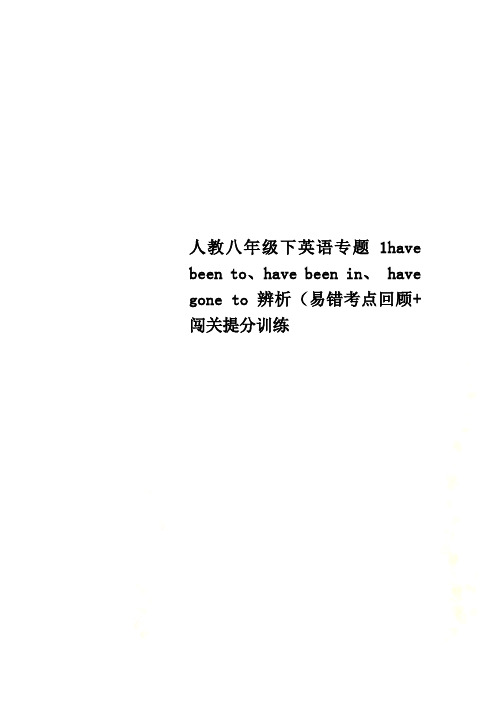
人教八年级下英语专题1have been to、have been in、 have gone to辨析(易错考点回顾+闯关提分训练have been to、have been in、 have gone to辨析【易错考点回顾】【易错点睛】have been to, have gone to和have been in是现在完成时的三个常见结构。
它们的用法有很大的差异。
have been to表示“过去曾去过某地”,说话时已不在该地。
have gone to则表示“已去了某地”,说话时还未回来。
have been in表示“已在某地(待了多久)”,若该地为小地方,则in需要用at代替,当后面跟副词时只用have been,其后不可用任何介词。
如:Jim has gone to London with his family. 吉姆已和他的家人去了伦敦。
Have you been to Beijing before? 你以前去过北京吗?The Greens have been in China for two years. 格林一家在中国已两年了。
一招制胜短语意义has/have been to +地点去过某地【中考链接】1.(2019扬州)—When will your sistergo to England?—She ______ London since four months ago.A. went toB. has gone toC. has been toD. has been in【答案】D解析:结合since four months ago可知动作发生在过去,持续了一段时间,故用现在完成时have/has + 过去分词,has gone to去了某地,has been to去过某地,has been in在某地待了一段时间,说话时去了英国,排除C,has gone to不能与一段时间连用,故选D。
人教部编版英语八年级下学期现在完成时讲解have been与have gone 区别
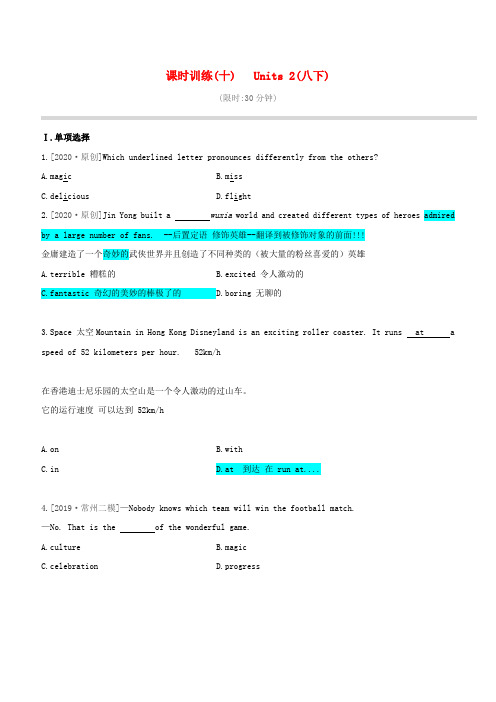
课时训练(十) Units 2(八下)(限时:30分钟)Ⅰ.单项选择1.[2020·原创]Which underlined letter pronounces differently from the others?A.magicB.missC.deliciousD.flight2.[2020·原创]Jin Yong built a wuxia world and created different types of heroes admired by a large number of fans. --后置定语修饰英雄--翻译到被修饰对象的前面!!!金庸建造了一个奇妙的武侠世界并且创造了不同种类的(被大量的粉丝喜爱的)英雄A.terrible 糟糕的B.excited 令人激动的C.fantastic 奇幻的美妙的棒极了的D.boring 无聊的3.Space 太空Mountain in Hong Kong Disneyland is an exciting roller coaster. It runs at a speed of 52 kilometers per hour. 52km/h在香港迪士尼乐园的太空山是一个令人激动的过山车。
它的运行速度可以达到 52km/hA.onB.withC.inD.at 到达在 run at....4.[2019·常州二模]—Nobody knows which team will win the football match.—No. That is the of the wonderful game.A.cultureB.magicC.celebrationD.progress5.[2019·贺州改编]—What a new look (外观,形象)our city has!--感叹句我们的城市拥有一个多么崭新的面貌啊!—Yes. Great changes have taken place 2008. 】2008是一个时间点!年月日时分秒都是时间点选一个介词(特殊连词)+时间点A.for× +时间段的B.in ?????+ 5days..7months+时间段C.sinceD.byHave/has done-----完成时!搭配可以和完成时搭配的时间提示词!6.[2019·苏州二模]Are you interested in novels by Victor Hugo, The Hunchback of Notre Dame?A.such asB.and so onC.for exampleD.all in all7.I'm a Singer is an interesting TV show that many people like watching it.A.so; thatB.such; thatC.so; asD.such; as一个有趣的电视节目--完整的名词性表语!我是歌手是 .... 一个有趣的电视节目很多人都喜欢收看它。
人教英语八年级下册 现在完成时 中考考点解读

Fill in the blanks with “since” and “for”.
for since since
1. I’ve know Li Lei _____ ten years.
2.I have lived here _____ 2f0o0r2.an hour
3.The meeting has been on ____ an housirnacgeo. 5.She has taught us ______I came to the school. 6.It’s about ten years ______ he left his home.
A. knew B. have known C. must know D. will know
2.You don’t need to go out to buy food. I ______C_some food
online.
A. order B. ordered C. have ordered D. will order
一.考点解读:
人教英语 8年级下册
现在完成时的中考考点: 考点1:考查基本概念。 考点2:考查时间状语。
考点3:考查与现一在般完过成去时时的区别。 考考点点45::考考查 查中非词考延组续h考a性点ve动解/h词读a的s b用e法en。to ,
have/has gone to与have/has been in/at的区别
since
since 和for 用法小结:
1.for+时间段
2.since+时间点(过去) 3.since+一段时间+ago=for+时间段 4.since+从句(常用一般过去时) 5.It’s+一段时间+since(过去时的句子)
最新人教版英语八年级下册Unit8-10语法重难点:现在完成时 专项复习 (有答案)
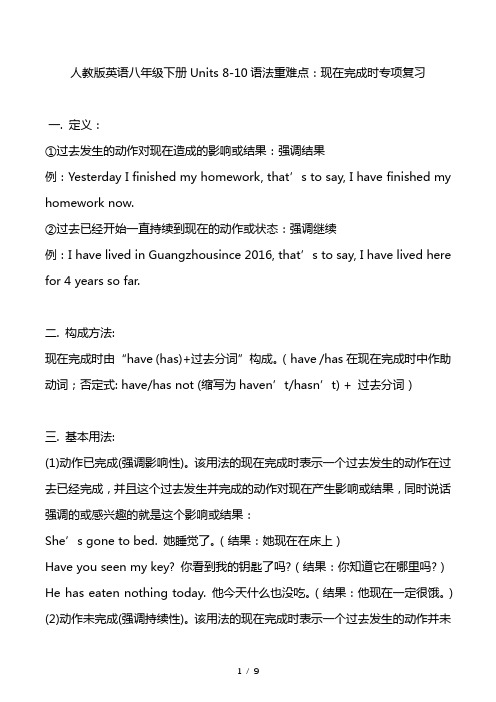
人教版英语八年级下册Units 8-10语法重难点:现在完成时专项复习一. 定义:①过去发生的动作对现在造成的影响或结果:强调结果例:Yesterday I finished my homework, that’s to say, I have finished my homework now.②过去已经开始一直持续到现在的动作或状态:强调继续例:I have lived in Guangzhousince 2016, that’s to say, I have lived here for 4 years so far.二. 构成方法:现在完成时由“have (has)+过去分词”构成。
(have /has在现在完成时中作助动词;否定式: have/has not (缩写为haven’t/hasn’t) + 过去分词)三. 基本用法:(1)动作已完成(强调影响性)。
该用法的现在完成时表示一个过去发生的动作在过去已经完成,并且这个过去发生并完成的动作对现在产生影响或结果,同时说话强调的或感兴趣的就是这个影响或结果:She’s gone to bed. 她睡觉了。
(结果:她现在在床上)Have you seen my key? 你看到我的钥匙了吗?(结果:你知道它在哪里吗?)He has eaten nothing today. 他今天什么也没吃。
(结果:他现在一定很饿。
)(2)动作未完成(强调持续性)。
该用法的现在完成时表示一个过去发生的动作并未在过去完成,而是一直持续到现在,并且有可能继续下去(也可能到此结束):Have you waited long? 你等了很久吗?We have been busy this afternoon. 今天下午我们一直很忙。
I抳e waited a week for your answer. 等你的回答我等了一个星期。
除以上用法外,现在完成时还可表示过去的重复动作甚至将来动作:He has always gone to work by bike. 他总是骑自行车上班。
八年级英语下册 专题1 have been to、have been in、 have gone to辨析练习 人教新目标版
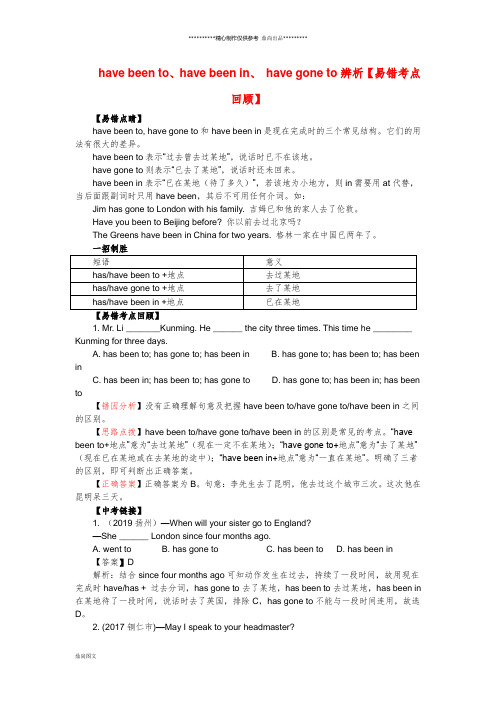
have been to、have been in、have gone to辨析【易错考点回顾】【易错点睛】have been to, have gone to和have been in是现在完成时的三个常见结构。
它们的用法有很大的差异。
have been to表示“过去曾去过某地”,说话时已不在该地。
have gone to则表示“已去了某地”,说话时还未回来。
have been in表示“已在某地(待了多久)”,若该地为小地方,则in需要用at代替,当后面跟副词时只用have been,其后不可用任何介词。
如:Jim has gone to London with his family. 吉姆已和他的家人去了伦敦。
Have you been to Beijing before? 你以前去过北京吗?The Greens have been in China for two years. 格林一家在中国已两年了。
【易错考点回顾】1. Mr. Li _______Kunming. He ______ the city three times. This time he ________ Kunming for three days.A. has been to; has gone to; has been inB. has gone to; has been to; has been inC. has been in; has been to; has gone toD. has gone to; has been in; has been to【错因分析】没有正确理解句意及把握have been to/have gone to/have been in之间的区别。
【思路点拨】have been to/have gone to/have been in的区别是常见的考点。
“have been to+地点”意为“去过某地”(现在一定不在某地);“have gone to+地点”意为“去了某地”(现在已在某地或在去某地的途中);“have been in+地点”意为“一直在某地”。
八年级英语上册语法3单元知识点归纳总结

八年级英语上册语法3单元知识点归纳总结一、文章引言:在我们探索八年级英语上册语法3单元的知识点时,首先需要明确这个单元的主题——现在完成时。
现在完成时是一种表示过去发生的事情对现在产生影响的时态,它强调的是过去和现在的联系,以及过去发生的事情对现在的影响。
下面,我们将详细地总结和归纳这个单元的主要语法知识点。
二、知识点一:现在完成时的基本结构及用法现在完成时的基本结构为:have/has + 过去分词,主要用来表达两个动作之间的联系,即一个动作发生在另一个动作之前。
其用法主要包括:1. 表示过去发生的事情对现在产生的影响。
例如:“I have seen that movie before.”(我以前看过那部电影。
)2. 表示一个动作在过去已经开始,但尚未完成。
例如:“I have been studying French for three years.”(我一直在学习法语三年了。
)三、知识点二:现在完成时的特殊用法现在完成时还有一些特殊的用法,包括:1. 与already, yet, just等副词连用。
例如:“Have you finished your homework alread y?”(你完成作业了吗?)2. 与yet连用时,表示动作还未完成。
例如:“I haven't finished my homework yet.”(我还没有完成作业。
)3. 与for, since等词连用,表示一段时间。
例如:“I have lived in this city for five years.”(我已经在这个城市住了五年了。
)四、知识点三:现在完成时的比较结构现在完成时的比较结构包括:had + 主语 + 过去分词,has/have + 主语 + done/being done等。
其用法主要包括:1. 表示两个动作发生时间的先后关系。
例如:“She has lived in London for years.”(她已经住在伦敦很多年了。
- 1、下载文档前请自行甄别文档内容的完整性,平台不提供额外的编辑、内容补充、找答案等附加服务。
- 2、"仅部分预览"的文档,不可在线预览部分如存在完整性等问题,可反馈申请退款(可完整预览的文档不适用该条件!)。
- 3、如文档侵犯您的权益,请联系客服反馈,我们会尽快为您处理(人工客服工作时间:9:00-18:30)。
人教新目标英语八年级下册现在完成时精讲
have been in, have been to 与have gone to的用法
一、have(has) been in 表示“在某地呆多长时间”,常与表示一段时间的状语连
用,如:since, for, how long 等。
例如:
Mr. Brown has been in Shanghai for five days. 布朗先生来上海已经有五天了。
此外还有这些搭配:have been here (there) /at home (school) /on the farm
have been here (there) / abroad
二、have(has)been to表示“曾经去过某地”,现在已经不在那里了。
可与just, ever,
never等连用。
例如:I have just been to the post office. 我刚才去邮局了。
Mary has never been to the Great Wall. 玛丽从未去过长城。
Have you ever been to Dongguan? 你曾经去过东莞吗?have(has) been to 后面可接次数,表示去过某地几次。
例如:(一)I have been to Beijing four times. 我去过北京四次。
(二)They have been to that village several times. 他们去过那个村庄好几次了。
三、have(has) gone to 意为“到某地去了”,表示到了某地或正在去某地的途中。
总之,说话时该人不在现场,一般不用第一、第二人称代词作句子的主语。
例如:----Where is Tom? ----He has gone to the bookshop. 汤姆在哪里?他到书店去了。
Jack Johnson has gone to London. 杰克.约翰逊到伦敦去了。
巩固练习:
一. 用have(has) been 或have(has) gone 填空。
A: Where ____________ Li Fei ___________?
B: He ____________ to Hainan Island.
A: How long ___________ he ___________ there?
B: He _____________ there for three days.
A: When will he come back , do you know?
B: I’m afraid he won’t come back recently.
A: Could you tell me the way to Hainan Island?
B: Sorry, I _________ never ___________ there.
A: How many times ___________ Li Fei __________ to that place?
B: He _____________ there only once.
二用have/has been to/in, have gone to及go的各种形式填空。
1) Where is Jack? He __________ his country.
2) David ________ the park just now.
3) John _______ England since he came back.
4) How long _____ have _____ this village?
5) The Smiths ______ Beijing for years.
6) _____ you ever ____ America? -- Yes, I _____ there many times.
7) I _____ this school since three years ago.
8) Where is Jim? He _____ the farm.
9) When_____ he _____? He _______ an hour ago.
10) Would you like to _____ the zoo with me? ---Yes, but I _____ there
before.
11) Where _____ you _____ now? --- I ____ the zoo.
12) He often _____ swimming.
13) _____ you ______ there last year?
14) _____ they often ______ skating in winter?
三.翻译下列句子:
1. 他已经来中国三年多了。
2. 他们出国两个月了。
3. 我从来没去过长城。
4. 你曾经出过国吗?
5. 他已经去图书馆了。
6. 他来这儿五年了。
7. 昨天他去了公园。
8. “你要去哪里?” “我要去学校。
”
9. 他常常去游泳。
10. 他们已经打扫了教室吗?
11. 我们已经认识有二十年了。
12. 打那以后,她一直住在这。
13. “你曾经到过那里吗?” “不,我从来没到过那里。
”
四. 用never, ever, already, yet, for, since填空
1. I have _______ seen him before, so I have no idea about him.
2. Jack has _________ finished his homework ________ an hour ago.
3. Mr. Wang has taught in this school ________ ten years.
4. “Have you ________ seen the film?” “No, I have ________ seen it.”
5. “Has the bus left _______?” “Yes, it has _________ left.”
五. 用适当的时态填空:
1.She’s _____________ (live) here ever since sh e was ten.
2.Both of them ________________ (be) in Hongkong for ten days.
3.Both of them ________________ (come) to Hongkong ten days ago.
4. Half an hour __________ (pass) since the train __________ (leave).
5. Mary______(lose) her pen. _______ you ______ (see) it here and there?
6. _____________ you ____________ (find) your watch yet?
7. ---Are you thirsty?
---No I _________ just _____________ (have) some orange.
8. We _____________already ______________ (return) the book.
9. ___________ they ____________ (build) a new school in the village?
10. I ________________(not finish) my homework . Can you help me?
11. My father _____ (read) the novel twice.
12. I _________ (buy) a book just now.
13. I _________ (lost ) my watch yesterday.
14. My father ___________ (read) this book since yesterday.
六.句型转换:
1. He has already gone home.
He _________ __________ home ____________. (否定句)
____________ he __________ home ___________? (疑问句)
2.He has lunch at home.
He __________ _____________ lunch at home. (否定句)
____________ he __________ lunch at home? (疑问句)
3.He has been there twice.
__________ __________ ________ __________ he been there? (划线提问) 4.I have lunch at school.
__________ __________ you ____________ lunch. (划线提问。
